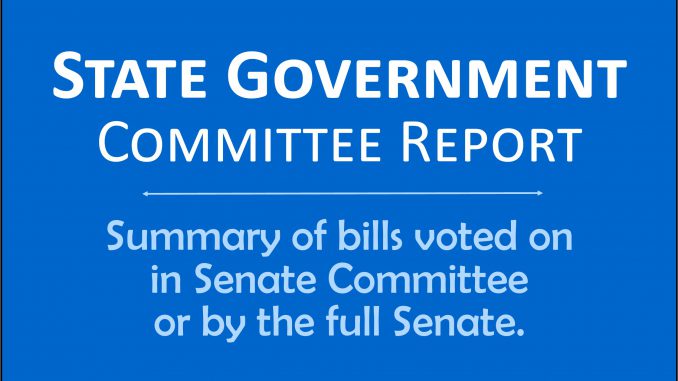
On this page
FLOOR ACTION:
HF 285 – Music therapist required to be credentialed
HF 285 requires any person claiming to be a music therapist to hold a music therapist board-certified credential granted by the certification board for music therapists. This is not a new license, but a profession protection bill. The bill does not prohibit a person from using music in the performance of the person’s profession if the person does not represent that they are a music therapist. A person who recklessly, knowingly or intentionally violates the bill is guilty of a simple misdemeanor, punishable by confinement for no more than 30 days or a fine of at least $105 but not more than $855 or by both.
[4/28: 44-4 (No: Brown, Carlin, Klimesh, Williams; Excused: Nunn, Schultz)]
HF 453 – Prohibit regulation beyond state/federal law
HF 453 provides that a state agency or state official will not impose any regulation or reporting requirement on corporations, as defined in section 504.141, that exceeds the requirements of state or federal law.
[4/28: 48-0 (Excused: Nunn, Schultz)]
HF 523 – Flood mitigation as essential county purpose
HF 523 would add flood-mitigation practices, strategies and structures to the list of essential county purposes established in Code. Counties are generally allowed to incur debt and issue general obligation bonds for the performance of essential purposes. This will allow a county to perform flood-mitigation projects in unincorporated areas of the county. Cities currently have this authority, but they are limited in where they are allowed to perform flood mitigation work. The bill is being promoted by Muscatine County as a way for them to create flood protection for areas increasingly under the threat of flood damage but are outside of the areas where a city can perform the work.
[4/28: 48-0 (Excused: Nunn, Schultz)]
HF 682 – Appraisal standards and appraiser certification changes
HF 682 comes from the Real Estate Appraiser Examining Board and modifies the current Code chapter regarding real estate appraisals and appraisers. The bill is designed to alleviate an enforcement gap for out-of-state certified appraisers conducting appraisals on property in Iowa. Federal law requires a real estate-related loan to be facilitated by a financial institution regulated by a federal financial institution regulator that requires the services of an appraiser and has a value greater than $400,000 (residential transactions) or $500,000 (commercial transactions).
But neither Iowa law nor federal law explicitly require that the appraiser be certified in the state where the appraised property is located. This discrepancy creates an enforcement gap because out-of-state appraisers arguably may perform appraisals in Iowa without first obtaining certification or a temporary practice permit from the Board. The interests of Iowans may be inadequately protected in these cases because regulators in the appraiser’s home state have less incentive to review appraisals conducted in Iowa, and the Board has no authority to enforce appraisal standards against the appraiser.
The bill addresses this gap by requiring that all appraisers who perform appraisals in Iowa to first become certified in Iowa or obtain a temporary practice permit. This proposal will also put Iowa on equal footing with neighboring states, all of which require Iowa appraisers to be certified or obtain temporary practice privileges before appraising property located in their states.
[4/28: 48-0 (Excused: Nunn, Schultz)]
HF 768 – Native distilleries, beer manufacturers, breweries, wine manufacturers
HF 768 authorizes native distilleries, native breweries, native wine manufacturers and beer manufacturers to be granted up to two class “C” permits to sell native wine at retail for consumption on the premises of the manufacturer or in a retail establishment operated by the manufacturer. Current law allows a manufacturer one class “C” permit to sell at retail for consumption on the premises of the manufacturing facility.
[4/28: 47-1 (No: Costello; Excused: Nunn, Schultz)]
